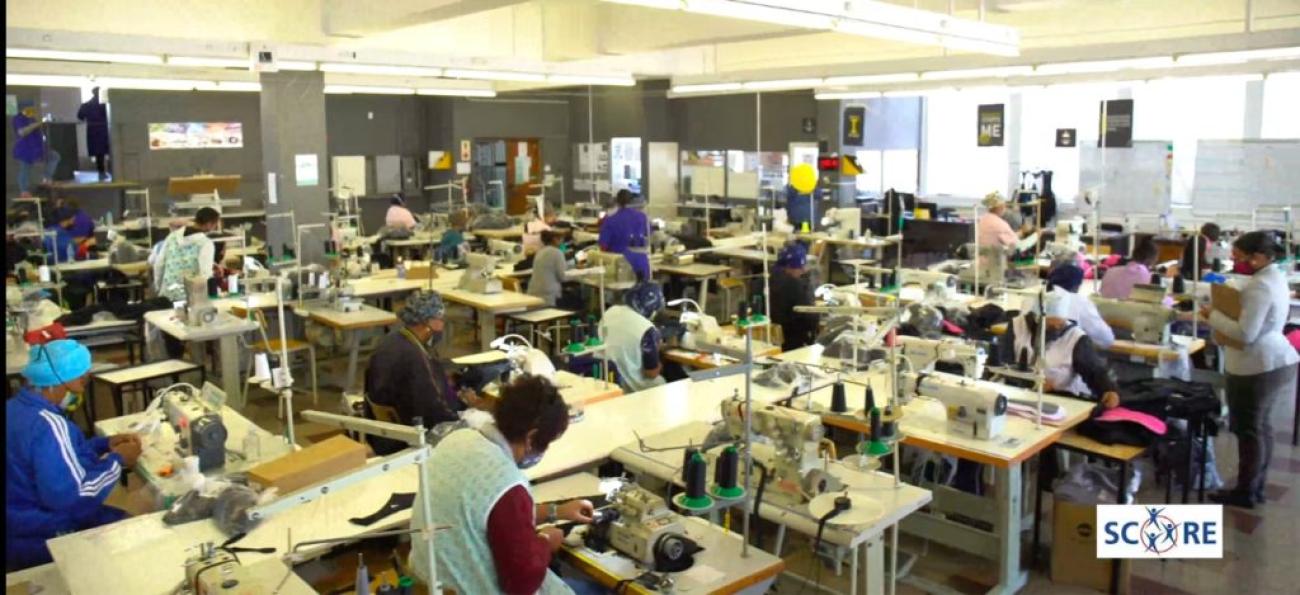Boosting productivity and better working conditions in SA’s cloth manufacturing sector

The South African Clothing and Textile Workers Union (SACTWU) was the first to recognize the relevance of SCORE to the garment manufacturing sector.
The 2018 Presidential Jobs Summit led to an agreement between the Government of South Africa and social partners to roll out inclusive and productive growth interventions in the manufacturing sector. The International Labour Organization (ILO)’s Sustaining Competitive and Responsible Enterprises Programme was subsequently piloted in collaboration with the National Bargaining Council for the Clothing and Manufacturing Industry. Other partners included the South African Clothing and Textile Workers Union, employers in the sector, Productivity SA and the European Union-funded Capacity Building Programme for Employment Promotion.
A webinar was held early this year to share lessons learned from the implementation of the programme among stakeholders, employers and trade unions in the sector as well as with enterprise owners and workers who participated in the programme.
The journey started in 2016, when the National Bargaining Council for the Clothing and Manufacturing Industry (NBCCMI), in tandem with the clothing industry trade union, SACTWU, and employer associations established the Productivity and Training Institute (PTI). The goal was to help clothing manufacturers and their employees develop competitive and sustainable workplaces through improved industrial relations
Battered by global competition, job cuts, declining consumer spending, and the gruelling effects of the Covid-19 pandemic, South Africa’s clothing and textile manufacturing sector has been struggling to thrive.
The implementation of the Sustaining Competitive and Responsible Enterprises (SCORE) programme was timely in that it assisted the industry get back on its feet. SCORE is a tried and tested programme by suppliers of major global brands and products. It is designed to achieve a “win-win” solution for employees and employers by improving workplace cooperation, quality productivity, workforce management and safety and health in the workplace. In addition, SCORE focuses on reducing costs, waste and environmental impact; upgrading of the working environment; increasing process systemisation and quality management; strengthening communication and joint problem solving through improved workplace collaboration as well as the use of measurements to drive continuous improvements.
The South African Clothing and Textile Workers Union (SACTWU) was the first to recognize the relevance of SCORE to the garment manufacturing sector and proposed it at the 2018 Presidential Jobs Summit. Subsequently, government and social partners chose the clothing and textile manufacturing industry for the pilot project because of the challenges faced by the sector. These include poor competition policies, strained employer-employee relationships in many unorganized firms, low levels of competitiveness especially with imports, outdated equipment and manufacturing technologies, and insufficient investment in the training and skills required to respond to changing market and consumer demands.
The two-hour webinar reflected on lessons learned by the trainers, employers and workers from the participating firms and supporting institutions. At the end of the seminar, Dr. Joni Musabayana, the ILO Director for South Africa, summarized some of the key take aways and paraphrased some of the key views expressed during the webinar.
- Small and Medium Enterprise (SMEs) are 5 ½ less productive than large enterprises;
- Productivity is not everything but in the long run it is almost everything with implications for socio-economic development;
- Decent work is at the core in South Africa, but it is an uphill struggle to compete in a sector with other countries that places less focus on decent work;
- The garment sector had 100,000 workers in the early 2000s, but then dropped to 50,000 over the years. With the severe impact from Covid-19, there are only 43,000 employees in the sector;
- We need to strengthen labour market institutions such as NBCCMI;
- What is unique about SCORE is its holistic approach at the work place with collaboration at the core. If adapted, the holistic approach will improve morale;
- Productivity is not only a managerial prerogative, we need to have workers voices heard;
In his closing remarks, Dr. Musabayana said ILO has developed a new and more holistic approach to productivity using the Productivity Ecosystem for Decent Work approach. This approach works at the firm-, sector- and policy-level to systematically identify and address bottlenecks and to strengthen some of the drivers for productivity and decent work in an integrated and sustainable manner.
Speakers at the event included entrepreneurs and workers from three of the participating enterprises: CIOVITA, Masana Clothing and the Foschini Group. Other speakers were Deputy Director-General in the Ministry of Employment and Labour, Sam Morotoba; the head of Cooperation of the EU Delegation to South Africa, Bernard Reay; the acting head of GTAC, Lindiwe Ndlela; the General Secretary of SACTWU, Andre Kriel; the CEO of the NBCCMI, Paul Wild; and the CEO of Productivity SA, Mothunye Mothiba. Additional speakers included Etienne Vlok of SACTWU; Ed Besson representing Employer Organizations; Vic Van Vuuren, Director of ILO Enterprise Department; Michael Elkin.

















